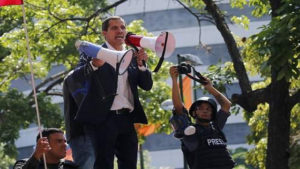 Yesterday Mr Juan Guaido — the Opposition chief who in January declared himself interim president — released a video recorded at an air force base in Caracas, showing him with a group of soldiers as well as Opposition politician Mr Leopoldo Lopez who was under house arrest on the orders of the Nicolas Maduro-led Government.
Yesterday Mr Juan Guaido — the Opposition chief who in January declared himself interim president — released a video recorded at an air force base in Caracas, showing him with a group of soldiers as well as Opposition politician Mr Leopoldo Lopez who was under house arrest on the orders of the Nicolas Maduro-led Government.
In the video, Mr Guaido said he has the support of “brave soldiers” who also freed Mr Lopez.
Immediately, the Government denounced the Opposition’s action as an “attempted military coup”.
Following on that, United States National Security Advisor John Bolton called on Venezuela’s defence chief and other key officials to oust President Maduro and warned them: “Your time is up.”
Mr Bolton increased the sabre-rattling by stating that “all options are on the table”. However, he said the main objective of the US Government remains “a peaceful transfer of power”.
At the same time, US President Donald Trump tweeted that he was following the situation “very closely” and said that, “The United States stands with the People of Venezuela and their Freedom!”
Later yesterday, Canadian Foreign Minister Chrystia Freeland called on Mr Maduro to “step aside now”, adding that “Venezuelans are in the streets today demonstrating their desire for a return to democracy, even in the face of a violent crackdown”.
She said that Mr Maduro should “allow for a peaceful end to this crisis in line with the Venezuelan Constitution”.
This crisis has been spiralling since January with Mr Guaido’s undemocratic declaration which has received support from more than 50 countries. That Mr Maduro has remained in office on the basis of an election that has largely been dismissed as fraudulent, and has continued to snub calls for free and fair elections, have only made matters worse.
Indeed, the Maduro Government went a step further by having the Venezuelan judiciary bar Mr Guaido from leaving the country and freezing his accounts. At the same time, the United States imposed sanctions on Venezuela’s State oil company PDVSA, and handed control of the country’s US bank accounts to Mr Guaido.
Amidst all this, Venezuelans feeling the effects of a ruined economy have been fleeing the country, and on March 7 most of the country was plunged into darkness by a major power cut that lasted five days, followed by sporadic blackouts, resulting in major disruption to food and water supplies, transportation, and hospital services.
We support the call made by United Nations Secretary General Antonio Guterres yesterday for all sides in this dispute to avoid violence, especially given the stark warning issued by Venezuela’s army chief and defence minister, General Vladimir Padrino, of possible “bloodshed” as reports of rioting in the country emerged.
The international community needs to make a concerted effort to ensure a peaceful way out of this crisis, through negotiation, with the understanding that only the Venezuelan people have the right to determine who governs their country.
It demands a commitment from all sides — Government, Opposition, the countries that have declared alliances in this conflict, and those that are non-aligned.
The Venezuelan people deserve no less.
